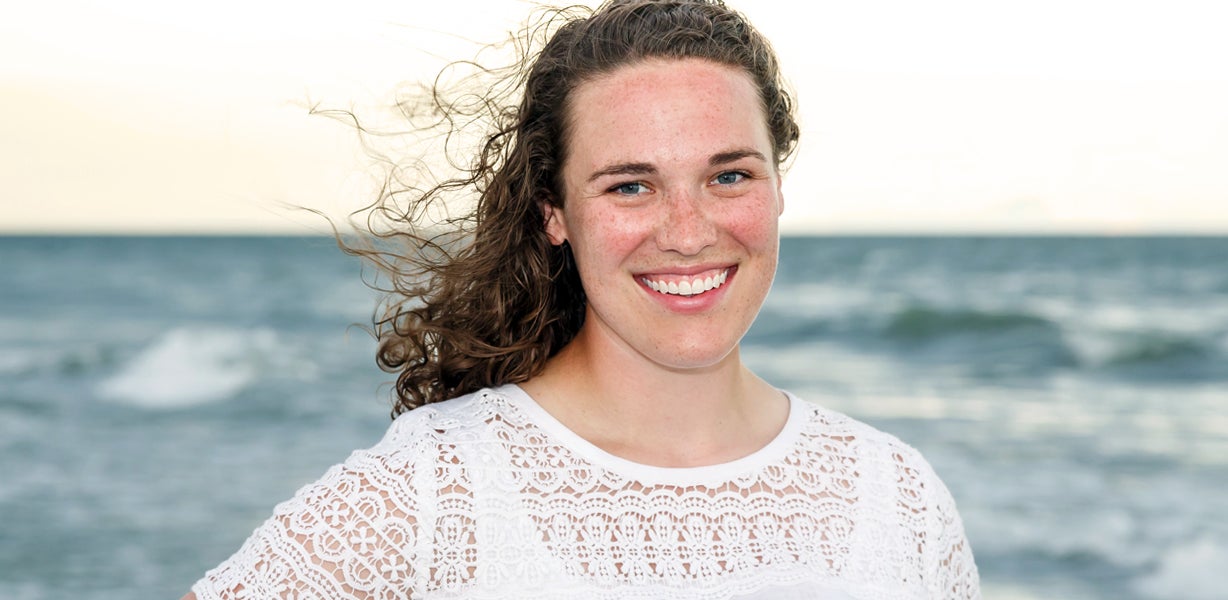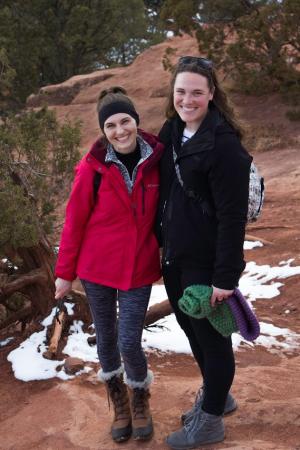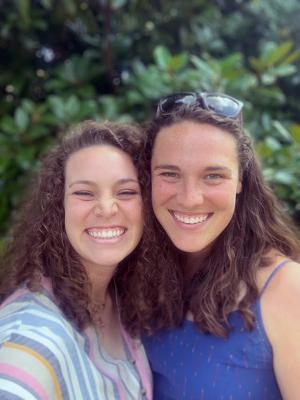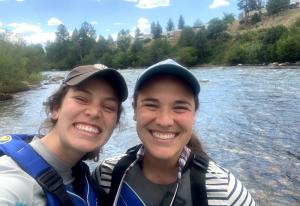Five questions for Kimberly Reeves
Sustainability at the University of Colorado Colorado Springs isn’t just focused on the environment, it’s also about supporting the student body.
As the sustainability program manager in the Office of Sustainability, Kimberly Reeves oversees a variety of programs, including the internship program. Before coming to UCCS in 2014, Reeves worked in sustainability offices at both Agnes Scott College, where she earned a bachelor’s degree in sociology and anthropology with a minor in environmental and sustainability studies, and at the University of Georgia, where she earned her master’s degree in environmental planning and design.
“At Agnes Scott, my first year was the first year the office was created, and I was the only student staff in the office,” she said. “It gave me the opportunity to have more senior experiences and expectations.”
Reeves’ mother is an educator, always looking for ways to help students gain knowledge from the environs.
“She took us on hikes and to museums, and that led me to realize that we should keep the world around us the same, if not better, for those who come after us,” Reeves said. “As an undergrad, I redid the campus arboretum and had to learn the names of plants. That helps ground me in where I am. When I first moved out here, one of the first things I asked for as a present was an identification book for plants. It helps you realize where you are and recognize that ecosystems are very different, and how you make decisions in life in different places is dependent on your ecosystem.”
1. Two of the programs you manage at UCCS are zero waste and Pedal Perks. How have these programs helped students, the campus and the community at large?
We have upwards of 13 different streams of waste, and I help manage the data analysis behind that and also the educational campaigns around helping us reduce contamination, specifically around recycling and composting. But it takes a village. We have so many campus partners, including our dining and hospitality services and catering team. They have gone from disposable, compostable materials for events to all reusable. That has been amazing, and we appreciate those efforts so much. Our office fully supports when departments take on additional ideas of how they can be more sustainable.
We’ve also had student employees create amazing campaigns. One student did an “Expresso Yourself” campaign. We conducted building waste audits to determine the most contaminated item in our recycling stream, and it was coffee cups. On campus they are compostable, but at off-campus store locations, they are trash unless they are cold beverages and they’re recyclable, but wait, dump the liquid/ice and trash the straw. It became a mouthful to explain how to properly dispose of coffee cups, so we decided to simplify it and focus on the “refuse” part of refuse, reduce, recycle theme. The campaign revolved around using your own cup. We handed out stickers from our on- and off-campus partners and handed out coffee, tea and hot chocolate to students who brought their own cups. I liked the positive approach of that campaign.
Many items are cradle to grave: they are created, they are used and then they have an end, which is usually the landfill. We like to think about cradle to cradle: how items can be used over and over again. For instance, reusable cutlery and serving ware takes water, but when you compare that with compostable items, the resources always win out for reusable.
The Pedal Perks program has 168 participants and each one gets a welcome bottle, an RFID tag and other resources. We’re also creating a community around biking. Because we are located on the bluffs, it is a bit more difficult to sell students on the idea that they can bike to and around campus. No matter which way you come to campus, you will come up a hill. We have a couple of alternative routes that get you to campus on a less intimidating path. We hope creating a community to share experiences will break down barriers of choosing an alternative to single-occupancy vehicle.
2. Are there other programs the office offers?
The sustainability office is located in the Sustainability Demonstration House, which is right next to our farmhouse and campus farm. We hope to continue investing in the house so that we will have a place where not only our campus community, but also our broader Colorado Springs community, can implement things in homes to make it more comfortable and save on energy and water bills. We are working with the Energy Resource Center, a nonprofit with a hub in Colorado Springs. The center helped over 600 families just at the Colorado Springs branch in the past year by retrofitting their homes.
The student-led Green Action Fund, which is funded by a $5 student fee, works through grants to help support our campus community to make it more sustainable. Both the Mountain Metro and Pedal Perks program have been heavily supported and piloted by funding through the Green Action Fund.
We also are encouraging departments to see how they can be more sustainable by creating green teams. The Kraemer Family Library Team Green was created in 2014, and they’ve seen many successes, including receiving funding through the Green Action Fund along with adopting a KFL Sustainability Strategic Plan. They use our office as a resource to figure out how to make their operations more efficient and use fewer resources along with creating a diverse, ethical space for our campus community.
A group of students, staff and I worked on the Mountain Metro College Pass pilot program, which is in its third year. We were able to get a $5 pass per student that the university continues to invest in, and we have anywhere from 400 to 500 unique riders and over 5,600 riders per month on average. It’s wonderful to be able to provide that service to our student body. For quite a few students, this is their main mode of transportation. It’s about creating that culture around transportation options and supporting our city infrastructure as well.
Riding the Mountain Metro or becoming part of Pedal Perks and recycling are all PIPs (Positive Impact Points) actions that students can do to earn PIPs.
3. PIPs (Positive Impact Points) Rewards is a program that UCCS implemented in August. What does the program entail and how has it been received?
PIPs is a mobile rewards program that students download. They earn PIPs – worth a penny – that they can redeem for various gift cards and scholarships. There are about 30 different ways that students can earn PIPs, including riding a bike, volunteering, attending UCCS events, refilling water bottles, answering trivia, riding the city bus, taking a fitness class at the rec center or recruiting a friend. The broader goal is to create a sense of community in those activities. Hopefully, they will continue the activities and that community will support them throughout their time at UCCS.
The PIPs program looks at the whole person. Of course, we would love for people to make small changes – and even larger changes – and to make better decisions in terms of sustainable options, but we also think about academic, physical, mental and emotional wellness. All of these things can be supported by having communities.
CU Boulder and UCCS currently are the only two institutions using PIPs, but others like the University of Kentucky and the University of Denver are considering it.
One of the best aspects of PIPs is the way it helps students who are looking for ways to bridge the gap. The majority of our students have a job, on or off campus, and are putting themselves through school. So to be able to do something they already are doing or get in the habit of doing and get paid for it is great. Our students are excited about PIPs, specifically about the scholarships.
Scholarships are available per semester, and students have to commit at least 10,000 PIPs, which is equivalent to $100, by a certain deadline each semester to be eligible for a monetary reward. PIPs for Schools will also do a 2-1 match, so a $300 check would be written to financial aid for the student.
Our greatest strength for the success of PIPs is our campus partners, which all have a way for students to earn PIPs. They see the value in creating a stronger community. Since the end of August, we’ve had more than 33,700 actions taken and 836,000 PIPs awarded from those actions. Right now, there are 1,394 users of the rewards program; 57% of all PIPs were committed to scholarships, and out of the gift cards redeemed, 59% were for food.
4. How has PIPs benefited the community at large?
It is estimated that since PIPs Rewards implementation, participating students have saved a total of 6,490 pounds of carbon dioxide and that is equivalent to 57 trees being planted. Our partner UCCSlead found that out of 250 students who attended an all-day leadership event, 184 of them earned PIPs. That number of students was the most they’ve seen at the Saturday event.
Word of mouth has been one of our best marketing strategies, and one of our next strategies is to highlight parts of the program they might not know so much about.
5. What activities or hobbies do you enjoy outside your work with the university?
I love being outside, and depending on the weather, I like to hike, raft, camp and ski. I also like to identify plants. I’m fortunate to live in a place that has access to all of that and have friends and family that help with that access. I had only been to Colorado once before coming here to work. It was right after my freshman year of high school. It was at the end of May, and being from Atlanta, my mom kept telling us to pack our winter coats. We were leaving almost 80-degree weather and we thought she was crazy. We went to Winter Park and it snowed a lot. Thankfully we all had our coats; we don’t argue with her about packing anymore.





